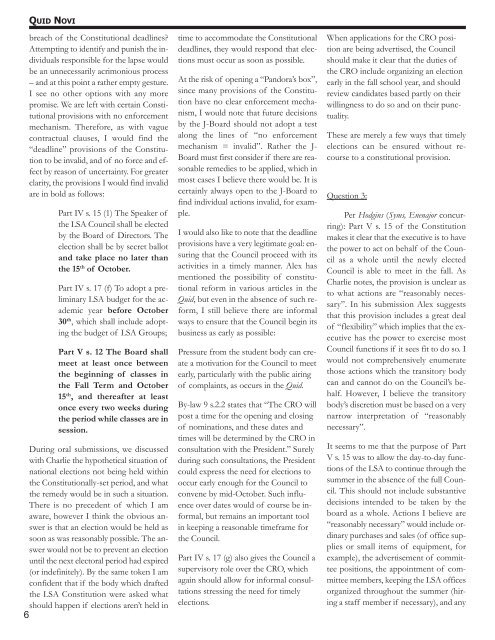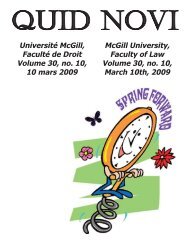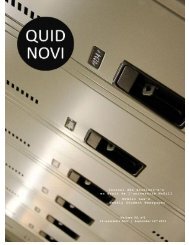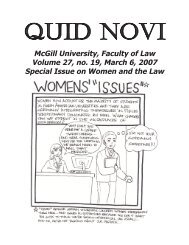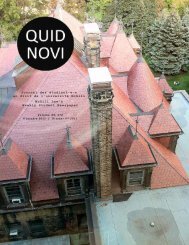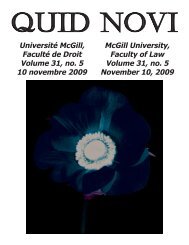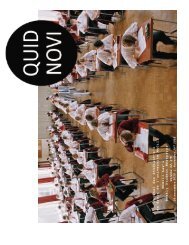March 23, 2010
March 23, 2010
March 23, 2010
You also want an ePaper? Increase the reach of your titles
YUMPU automatically turns print PDFs into web optimized ePapers that Google loves.
QUID NOVI<br />
breach of the Constitutional deadlines<br />
Attempting to identify and punish the individuals<br />
responsible for the lapse would<br />
be an unnecessarily acrimonious process<br />
– and at this point a rather empty gesture.<br />
I see no other options with any more<br />
promise. We are left with certain Constitutional<br />
provisions with no enforcement<br />
mechanism. Therefore, as with vague<br />
contractual clauses, I would find the<br />
“deadline” provisions of the Constitution<br />
to be invalid, and of no force and effect<br />
by reason of uncertainty. For greater<br />
clarity, the provisions I would find invalid<br />
are in bold as follows:<br />
Part IV s. 15 (1) The Speaker of<br />
the LSA Council shall be elected<br />
by the Board of Directors. The<br />
election shall be by secret ballot<br />
and take place no later than<br />
the 15 th of October.<br />
Part IV s. 17 (f) To adopt a preliminary<br />
LSA budget for the academic<br />
year before October<br />
30 th , which shall include adopting<br />
the budget of LSA Groups;<br />
Part V s. 12 The Board shall<br />
meet at least once between<br />
the beginning of classes in<br />
the Fall Term and October<br />
15 th , and thereafter at least<br />
once every two weeks during<br />
the period while classes are in<br />
session.<br />
During oral submissions, we discussed<br />
with Charlie the hypothetical situation of<br />
national elections not being held within<br />
the Constitutionally-set period, and what<br />
the remedy would be in such a situation.<br />
There is no precedent of which I am<br />
aware, however I think the obvious answer<br />
is that an election would be held as<br />
soon as was reasonably possible. The answer<br />
would not be to prevent an election<br />
until the next electoral period had expired<br />
(or indefinitely). By the same token I am<br />
confident that if the body which drafted<br />
the LSA Constitution were asked what<br />
should happen if elections aren’t held in<br />
6<br />
time to accommodate the Constitutional<br />
deadlines, they would respond that elections<br />
must occur as soon as possible.<br />
At the risk of opening a “Pandora’s box”,<br />
since many provisions of the Constitution<br />
have no clear enforcement mechanism,<br />
I would note that future decisions<br />
by the J-Board should not adopt a test<br />
along the lines of “no enforcement<br />
mechanism = invalid”. Rather the J-<br />
Board must first consider if there are reasonable<br />
remedies to be applied, which in<br />
most cases I believe there would be. It is<br />
certainly always open to the J-Board to<br />
find individual actions invalid, for example.<br />
I would also like to note that the deadline<br />
provisions have a very legitimate goal: ensuring<br />
that the Council proceed with its<br />
activities in a timely manner. Alex has<br />
mentioned the possibility of constitutional<br />
reform in various articles in the<br />
Quid, but even in the absence of such reform,<br />
I still believe there are informal<br />
ways to ensure that the Council begin its<br />
business as early as possible:<br />
Pressure from the student body can create<br />
a motivation for the Council to meet<br />
early, particularly with the public airing<br />
of complaints, as occurs in the Quid.<br />
By-law 9 s.2.2 states that “The CRO will<br />
post a time for the opening and closing<br />
of nominations, and these dates and<br />
times will be determined by the CRO in<br />
consultation with the President.” Surely<br />
during such consultations, the President<br />
could express the need for elections to<br />
occur early enough for the Council to<br />
convene by mid-October. Such influence<br />
over dates would of course be informal,<br />
but remains an important tool<br />
in keeping a reasonable timeframe for<br />
the Council.<br />
Part IV s. 17 (g) also gives the Council a<br />
supervisory role over the CRO, which<br />
again should allow for informal consultations<br />
stressing the need for timely<br />
elections.<br />
When applications for the CRO position<br />
are being advertised, the Council<br />
should make it clear that the duties of<br />
the CRO include organizing an election<br />
early in the fall school year, and should<br />
review candidates based partly on their<br />
willingness to do so and on their punctuality.<br />
These are merely a few ways that timely<br />
elections can be ensured without recourse<br />
to a constitutional provision.<br />
Question 3:<br />
Per Hodgins (Syms, Enenajor concurring):<br />
Part V s. 15 of the Constitution<br />
makes it clear that the executive is to have<br />
the power to act on behalf of the Council<br />
as a whole until the newly elected<br />
Council is able to meet in the fall. As<br />
Charlie notes, the provision is unclear as<br />
to what actions are “reasonably necessary”.<br />
In his submission Alex suggests<br />
that this provision includes a great deal<br />
of “flexibility” which implies that the executive<br />
has the power to exercise most<br />
Council functions if it sees fit to do so. I<br />
would not comprehensively enumerate<br />
those actions which the transitory body<br />
can and cannot do on the Council’s behalf.<br />
However, I believe the transitory<br />
body’s discretion must be based on a very<br />
narrow interpretation of “reasonably<br />
necessary”.<br />
It seems to me that the purpose of Part<br />
V s. 15 was to allow the day-to-day functions<br />
of the LSA to continue through the<br />
summer in the absence of the full Council.<br />
This should not include substantive<br />
decisions intended to be taken by the<br />
board as a whole. Actions I believe are<br />
“reasonably necessary” would include ordinary<br />
purchases and sales (of office supplies<br />
or small items of equipment, for<br />
example), the advertisement of committee<br />
positions, the appointment of committee<br />
members, keeping the LSA offices<br />
organized throughout the summer (hiring<br />
a staff member if necessary), and any


